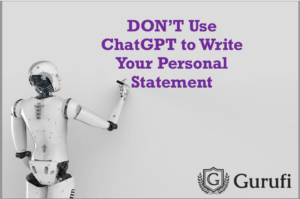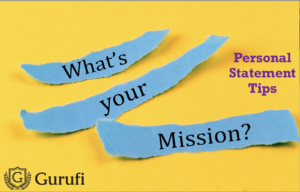
Since founding Gurufi in 2008, I have helped clients fix, tighten, and rework probably 15,000 personal statements. Because I’ve had so many reps, I can instantly spot what I’ve come to call “the Frankenstein Essay.”
These essays are distinctive for their abrupt change of voice, inexplicable jumps between narratives, and the overall sense that I’m not reading a single coherent essay, but rather a weird amalgam pieced together from the parts of five or six different sources. Whenever I get one of these, I’ll ask a client, “so, how many people did you show the first draft of your personal statement to?” Without fail, they’ll tell me that they showed everybody they could think of who might help: their roommate, a professor, the school’s premed / pre-law advisor, etc.
This is a huge mistake.
Look, it’s understandable that once you’ve finished your personal statement, you may feel a little apprehensive about what you have written, and as such it is only reasonable to seek out second and third opinions in order to make sure that you have overlooked nothing, the prose is tight, and you have made a compelling case for your candidacy. But, just as an excellent revision and editing can make an average essay excellent, bad editing can wreck an essay. On such occasions, one is smart to heed the old aphorism that ‘too many cooks spoil the broth.’
Once you have completed your first draft, you need to think carefully about how you go about using advice from other people. Here are six pointers for how to get the best advice in order to turn your draft into an excellent final version you are proud of and happy with.
1.) Be careful about who you pick.
Obviously, you want to get advice from someone who writes well, can be frank with you, and has some understanding of the field to which you are applying. If you choose to get advice from a boyfriend or your mother, for example, then be careful because they might give you an overly glowing review because of their esteem and love for you or may lack the qualifications to point out minor problems with your approach. Similarly, asking your English major friend to look at your Engineering graduate school essay is not a bad idea, but if you go that route, having someone involved in engineering (preferably in an academic capacity) also look at your essay is a good idea.
Good people to talk to are your academic advisor (if you are applying to graduate or professional schools) or guidance counselor (if you are applying to college). I know that many people will take their essays to message boards and post them to see what people think of it. This is the one thing I would advise you NEVER to do. The problem here is that you have no real way to gauge someone’s level of expertise and you may get too much feedback from too many sources.
Which leads us to point #2…
- Don’t give it to too many people.
If you get critiques on your essay from 8-9 different people and you incorporate all of their suggestions, you will be pulled in too many directions and the essay will lose its sense of voice and focus. The old joke that a camel is a horse designed by committee applies here. Your essay cannot be everything to everyone, and you must accept this fact. There will always be something that someone would have done differently, so they will often naturally advise you that you should do something different than what you are doing.
- Ask follow-up questions
Whenever someone suggests a change, don’t be afraid to ask them about it. Sometimes you will agree with their rationale but disagree with the execution of the change. Also, through a conversation people will often help you see larger problems that you may have missed. People are often hesitant to give tough advice, and a friendly conversation can help you avoid this problem because by talking to someone, the person will see that you are serious about valuing their advice.
The most frequent form of advice that people will give is, “you should include _____.” Now, this is often useful advice, but because most personal statements have tight word caps, you can’t just add everything that might kinda-sorta be relevant. Thus, in my experience, one of the best questions you can ask is, “if you think that I should add ____, what do you think I should take out to make room for this new text?”
The reason is that writing is about choices, and just because something is relevant in the abstract doesn’t mean that it should be included in your essay. If their suggestion for what you should remove to make room for their suggested new text is something that you don’t think you can lose, then that may indicate that you should ignore this bit of advice.
Which brings us to Point #4:
- Don’t be afraid to ignore advice.
At the end of the day, this is *your* personal statement, and *your* future depends on how well you execute it. When someone suggests changes, consider their level of expertise (both as a writer and as a subject-matter expert), think about it carefully and, if you disagree, then don’t do it. Not every piece of advice given is good; often, you will receive terrible advice.
The final decision is yours, so take your role as the gatekeeper of advice seriously, and only let the best suggestions that work well with your theme, tone, approach and goal through.
- BUT, try to avoid pride of authorship
In my capacity as an admissions essay consultant, I often encounter customers who are furious when I tell them that they have things that they need to work on. It is almost as if they paid me $500 for me to tell them that their work was perfect, and they should not change a single letter.
Because a personal statement is so, well, personal, it can sometimes sting when someone gives you pointed advice. Try to see the bigger picture and embrace the process that will help you to move towards a better and stronger essay. Do your best not to see a critique of your essay as a criticism of you as a person, and rather see it as a positive moment that moves you one step closer to your goal.
They can be a bit expensive, but in the end, if you’re willing to tens -or even hundreds- of thousands of dollars on college or graduate school, spending a small fraction of that to get you into your desired school only makes sense. Getting into a top school, as opposed to an average one, is worth investing in.
Some things to consider:
-Make sure that they guarantee your satisfaction.
-Ask if they will work with you beyond just receiving a single revision back from you. Often, it will take 2-3 exchanges with your editor to completely understand what you want to say, how you want to say it, and what core message you want to convey.
In the end, selecting the right editor / consultant is a personal choice about vibe and fit. We at Gurufi.com understand that admissions can be a stressful and opaque process, and our editors are fantastic at working with you to produce a powerful essay that reflects your personality and aspirations.
For more help with your personal statement, check us out at Gurufi.com. Our personal statement editors and consultants have decades of experience helping clients get into top Masters and Ph.D. programs in STEM, humanities, fine arts, and social sciences. Our specialty is helping you craft compelling personal statements that move the needle in your admissions process! For questions, shoot us an email at service@gurufi.com. Check us out on Facebook, Twitter, and LinkedIn.








